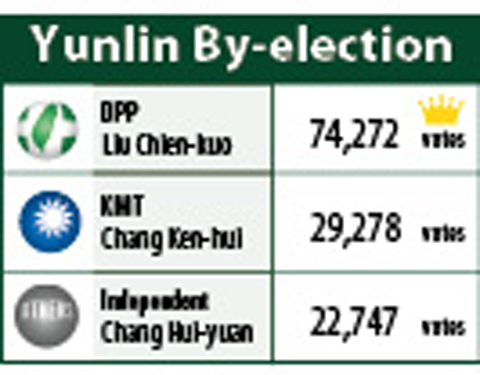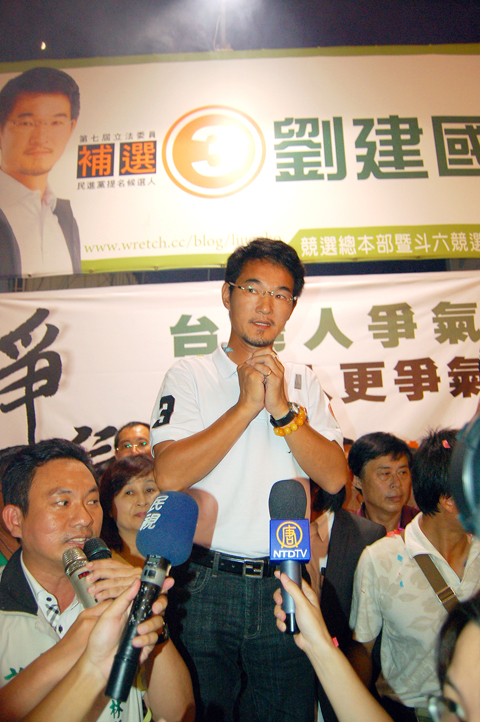Democratic Progressive Party (DPP) candidate Liu Chien-kuo (劉建國) secured a landslide victory in yesterday’s Yunlin legislative by-election, giving the party a boost as corruption charges against former president Chen Shui-bian (陳水扁) continue to dog the opposition party.
Liu garnered 74,272 votes, beating his Chinese Nationalist Party (KMT) rival Chang Ken-hui (張艮輝) by nearly 45,000 votes. Voter turnout was 45.55 percent.
The DPP had previously said that former Department of Health minister Yeh Ching-chuan’s (葉金川) defeat in the KMT primary for the Hualien County commissioner election in August was a reflection of growing discontent with the government and a mark of no-confidence in President Ma Ying-jeou (馬英九).

It had also said that the KMT would suffer a setback in the Yunlin County legislative by-election.
Liu’s victory was significant to the DPP, which prior to the vote held 27 legislative seats, one shy of a quarter of the 113-seat legislature.
With a quarter of legislative seats, the DPP will be eligible to propose a recall of the president or vice president, as well as constitutional amendments.

PHOTO: LIN KUO-HSIEN, TAIPEI TIMES
Bowing to his supporters, Liu said his victory was not his alone but that of the residents of Yunlin and the people of Taiwan.
“Today marks a very touching day in the history of Taiwan’s democracy,” he said at his campaign office.
“Yunlin residents’ hope for a better democracy and cleaner politics has finally come true. We oppose vote-buying and we utterly detest smear campaigns. That is the key to my victory,” he said.
Liu said his win showed that democratic politics trounced factional politics. It also showed that even a poor kid like him had the opportunity to serve the people and the country.
“The people used their ballots to prove that I am not a gangster,” he said.
In a statement, the DPP thanked voters for giving the party another chance to serve the public.
The by-election campaign saw the three contenders attack and sue each other. Independent candidate Chang Hui-yuan (張輝元) branded Liu a “gangster” and accused KMT candidate Chang Ken-hui of buying votes. Liu sued Chang Hui-yuan for slander.
The by-election was necessary to fill the seat left vacant by Chang Hui-yuan’s son, Chang Sho-wen (張碩文), who won the seat in January last year, but lost it this year after the High Court found him guilty of taking part in a vote-buying scheme organized by his father.
Chang Hui-yuan — who was found guilty of vote buying in the first trial — wanted to run as the KMT candidate in the election, but the party rejected his registration because its “black-gold exclusion clause” prevents party members found guilty of corruption in their first trial from standing for public office.
Chang Sho-wen filed a defamation lawsuit against Chang Ken-hui at the Yunlin Prosecutors’ Office on Monday, accusing him of making groundless vote-buying allegations.
Chang Ken-hui yesterday attributed his defeat to time constraints, saying he only had 48 days to campaign and that most voters were not familiar with him.
Conceding defeat, he gave Liu his blessing and said he would respect the people’s decision.
He said he did not work hard enough and that he would examine himself honestly.
He declined to comment on factionalism or a split within the KMT, but said that “somebody used despicable means during the campaign.”
“All I wanted was a fair election,” he said.
There were signs that KMT heavyweights were cool to Chang Ken-hui standing as the party’s candidate. During a campaign rally last Saturday, KMT Chairman Wu Poh-hsiung (吳伯雄) said it was Premier Wu Den-yi who had recommended that Chang Ken-hui stand in the by-election during his stint as KMT secretary-general.
Analysts saw Wu Poh-hsiung’s remarks as a means to distance himself from Chang Ken-hui if he failed.
Neither Ma nor Legislative Speaker Wang Jin-pyng (王金平) stumped for Chang Keng-hui.
In a statement yesterday, the KMT said it respected the choice of Yunlin residents, adding it was aware of the difficult situation in the run-up to the election, but had insisted on nominating a young, professional academic with a clean image.
The party is determined to reform because only reform will bring hope, the statement said. It also called for unity among party members.
ADDITONAL REPORTING BY STAFF WRITER

US President Donald Trump yesterday announced sweeping "reciprocal tariffs" on US trading partners, including a 32 percent tax on goods from Taiwan that is set to take effect on Wednesday. At a Rose Garden event, Trump declared a 10 percent baseline tax on imports from all countries, with the White House saying it would take effect on Saturday. Countries with larger trade surpluses with the US would face higher duties beginning on Wednesday, including Taiwan (32 percent), China (34 percent), Japan (24 percent), South Korea (25 percent), Vietnam (46 percent) and Thailand (36 percent). Canada and Mexico, the two largest US trading

ACTION PLAN: Taiwan would expand procurement from the US and encourage more companies to invest in the US to deepen bilateral cooperation, Lai said The government would not impose reciprocal tariffs in retaliation against US levies, President William Lai (賴清德) said yesterday, as he announced five strategies to address the issue, including pledging to increase Taiwanese companies’ investments in the US. Lai has in the past few days met with administrative and national security officials, as well as representatives from various industries, to explore countermeasures after US President Donald Trump on Wednesday last week announced a 32 percent duty on Taiwanese imports. In a video released yesterday evening, Lai said that Taiwan would not retaliate against the US with higher tariffs and Taiwanese companies’ commitments to

‘SPECIAL CHANNEL’: Taipei’s most important tasks are to stabilize industries affected by Trump’s trade tariffs and keep negotiations with Washington open, a source said National Security Council Secretary-General Joseph Wu (吳釗燮) arrived in the US for talks with US President Donald Trump’s administration, a source familiar with the matter said on Friday. Wu was leading a delegation for a meeting known as the “special channel,” the Financial Times reported earlier. It marked Trump’s first use of the channel since returning to the White House on Jan. 20. Citing a source familiar with the matter, the Financial Times reported that Minister of Foreign Affairs Lin Chia-lung (林佳龍) was also a part of the delegation. The visit came days after China concluded war games around Taiwan and amid Trump’s

CHIP EXCEPTION: An official said that an exception for Taiwanese semiconductors would have a limited effect, as most are packaged in third nations before being sold The Executive Yuan yesterday decried US President Donald Trump’s 32 percent tariff on Taiwanese goods announced hours earlier as “unfair,” saying it would lodge a representation with Washington. The Cabinet in a statement described the pledged US tariffs, expected to take effect on Wednesday next week, as “deeply unreasonable” and “highly regrettable.” Cabinet spokeswoman Michelle Lee (李慧芝) said that the government would “lodge a solemn representation” with the US Trade Representative and continue negotiating with Washington to “ensure the interests of our nation and industries.” Trump at a news conference in Washington on Wednesday announced a 10 percent baseline tariff on most goods